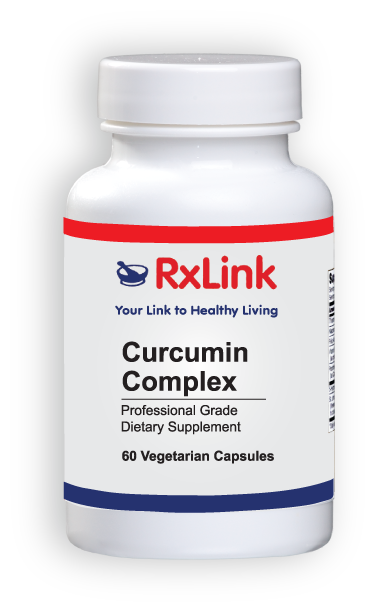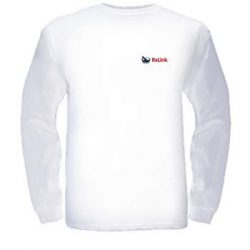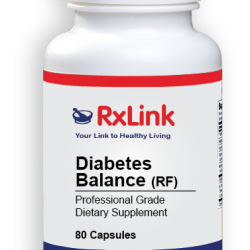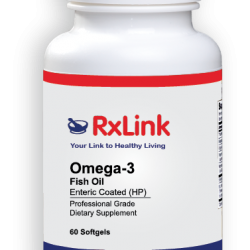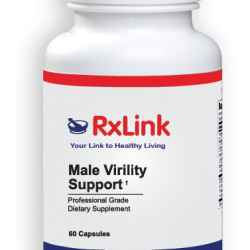Description
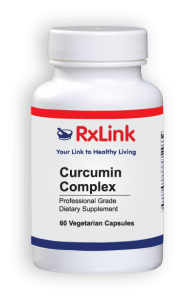
DESCRIPTIONRxLink Turmeric is a traditional Indian culinary spice and Ayurvedic medicine that has been utilized for a wide array of medicinal purposes. Its most common traditional use has been to promote proper digestion. Even the German Commission E Monograph on turmeric describes it as an approved medicinal herb for dyspeptic (indigestion) conditions. In the last decade, turmeric has received tremendous attention and numerous clinical studies have confirmed its health-promoting effects and specifically supporting a healthy inflammatory response.
FUNCTIONS Antioxidant nutrients are necessary to protect the body from the destructive effects of harmful molecules that cause oxidation. Because these molecules are highly reactive, they are called reactive species and have a strong tendency to grab an electron from other molecules and damage delicate cellular structures, unsaturated fatty acids and even DNA. Thus, the role of antioxidants is to prevent this damage by balancing the pro-oxidative/anti-oxidative states of the body. Oxidative stress is a term given when oxidation outpaces the body’s ability to neutralize free radicals and is a key factor in the inflammatory process. These reactive radicals and oxidants may injure cells and tissue directly via oxidative degradation as well as injure cells indirectly by altering signaling processes that exist within the tissue to be pro-inflammatory. Antioxidants may help play a role in regulating inflammation by neutralizing free radicals and contributing to a normal and healthy inflammatory response. Turmeric contains a group of compounds called curcuminoids that have shown to possess potent antioxidant properties. Curcumin is the main yellow constituent of turmeric and most biologically active as a potent antioxidant. Curcuminoids have also been shown to inhibit the metabolism of arachidonic acid (a pro-inflammatory fatty acid) by inhibiting cyclooxygenase-2 (COX-2) and lipoxygenase enzymes. Collectively, turmeric’s ability to support a healthy inflammatory response is a function of its antioxidant properties and inhibitory effect on mechanisms that support inflammation. RxLink Curcumin Complex features Sabinsa’s Curcumin C3 Complex®; made up of three main chemical compounds: curcumin, demethoxycurcumin and bisdemethoxycurcumin, collectively known as curcuminoids. Curcumin C3 Complex was the only turmeric chosen by the National Cancer Institute (NCI) for clinical studies.
INDICATIONS Curcumin Complex may be a useful dietary supplement for those who wish to help support a healthy, normal inflammatory response.
FORMULA (RxLink10251) 1 Vegetarian Capsule Contains:
Turmeric Root Extract (Curcuma longa) …………500 mg (Standardized to 95% [475 mg] curcuminoids from Curcumin C3 Complex)
Other Ingredients: Capsule (cellulose, water), magnesium stearate, and silica. This product contains NO sugar, salt, dairy, yeast, wheat, gluten, corn, soy, preservatives, artificial colors or flavors.
SUGGESTED USE As a dietary supplement, adults take 1 vegetarian capsule daily, or as directed by a healthcare professional.
SIDE EFFECTS Warning: Consult your physician prior to using this product if you are pregnant or nursing, taking medications, or have a medical condition. Discontinue use two weeks prior to surgery. STORAGE Store in a cool, dry place, away from direct light. Keep out of reach of children.
REFERENCES Conner EM, Grisham MB. Inflammation, free radicals, and antioxidants. Nutrition. 1996 Apr;12(4):274-7. Kuhn MA, Winston D: Herbal Therapy and Supplements: A Scientific & Traditional Approach. New York: Lippincott; 2001:330-335. Kohli K, Ali J, Ansari MJ, Raheman Z: Curcumin: a natural antiinflammatory agent. Indian J Pharmacol 2005, 37:141-147. Shakibaei M, John T, Schulze-Tanzil G, Lehmann I, Mobasheri A: Suppression of NF-κB activation by curcumin leads to inhibition of expression of cyclo-oxygenase-2 and matrix matalloproteinase-9 in human articular chondrocytes; Implications for the treatment of osteoarthritis.Biochem Pharmacol 2007, 73:1434-1445. Nita CW: Safety and anti-inflammatory activity of curcumin: a component of turmeric (Curcuma longa). J Alternative Complementary Med 2003, 9:161-168. Priyadarsini KI, Maity DK, Naik GH, Kumar MS, Unnikrishnan MK, Satav JG, Mohan H: Role of phenolic O-H and methylene hydrogen on the free radical reactions and antioxidant activity of curcumin. Free Rad Biol Med 2003, 35:475-484. Volak LP, Ghirmai S, Cashman JR, Court MH. Curcuminoids inhibit multiple human cytochromes P450, UDP-glucuronosyltransferase, and sulfotransferase enzymes, whereas piperine is a relatively selective CYP3A4 inhibitor. Drug Metab Dispos. 2008.

